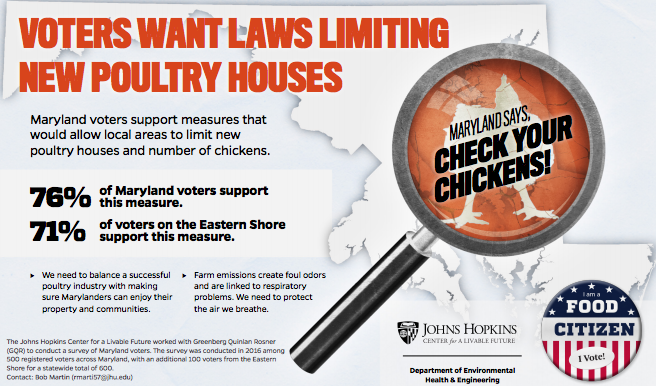Republican Maryland Favors Regulations for Poultry Industry
Last month, every county on Maryland’s Eastern Shore voted red, choosing the Republican presidential candidate by safe margins. In Worcester County, votes for the Republican candidate nearly doubled those for Democratic candidate Hillary Clinton.
But do voters in these four counties—Dorchester, Wicomico, Somerset and Worcester—really want, as promised by the Republican candidate, an end to regulations on industry? A recent public opinion poll by the Johns Hopkins Center for a Livable Future suggests the opposite.
In fact, according to the poll of 600 registered voters across Maryland, weighted for input from the Eastern Shore, what voters really want is more regulation of the poultry industry. In particular, they want regulations that would limit the rapidly expanding number of chicken houses in their communities. It seems that Marylanders, even those who say that the chicken industry is vital to the state’s economy and to keeping food affordable, want their air and drinking water to be safe and to not smell bad. According to the poll, they want to be able to enjoy their property and protect the state’s potential for earning tourism dollars.

It’s not only this poll that illustrates the Eastern Shore’s desire for more regulations. Rona Kobell of the Bay Journal has reported movements in Somerset, Worcester and Wicomico counties to revise the zoning laws regarding chicken houses. The zoning reforms, at this stage, are mostly targeting setback laws. For example, up until September, Wicomico required chicken houses to be set back 100 feet from the property line as a buffer between the operation and residences; the new restrictions passed in September require a 400-foot setback for poultry houses from neighboring buildings and a 200-foot setback from all property lines. There are still no laws that address the public health issues from living near chicken houses, and neither the EPA nor the state’s Department of Environment regulate—or even monitor—air emissions from the chicken houses. But the setback laws may be the first baby steps to more meaningful regulations that could protect public health.
The CLF poll also showed that Maryland voters support regulatory measures to make chicken processing companies pay for the removal of excess waste; under the current system individual growers are stuck with the costs of dealing with chicken waste. The whole contract system under which chicken growers labor, and which leaves seven in 10 growers living below the poverty line, needs to reformed—at the very least, said the surveyed voters, the contract system should be more transparent and it should not use an outdated system known as the “tournament pricing” system that pits growers against each other. (This blogpost does a great job describing the tournament pricing system.)
According to the poll, 60 percent of those surveyed said they believe that government should solve problems and meet needs. The majority also said that they would feel more favorably toward a legislator who supports increased oversight. That seems like a clear call for regulations—even in red counties. Will the state legislators heed the will of the voters?
In Dorchester County and Wicomico County, the state senator is Adelaide C. Eckardt and in Somerset and Worcester counties, the state senator is James N. Mathias, Jr.
State delegates representing Eastern Shore counties are Christopher Adams, Carl Anderton, Mary Beth Carozza, Johnny Mautz, Charles Otto and Sheree Sample-Hughes. Charles Otto (District 38A) is the president of the Wicomico Country Farm Bureau and past president of the Somerset Country Farm Bureau, an organization consistently opposed to regulating farming industries.